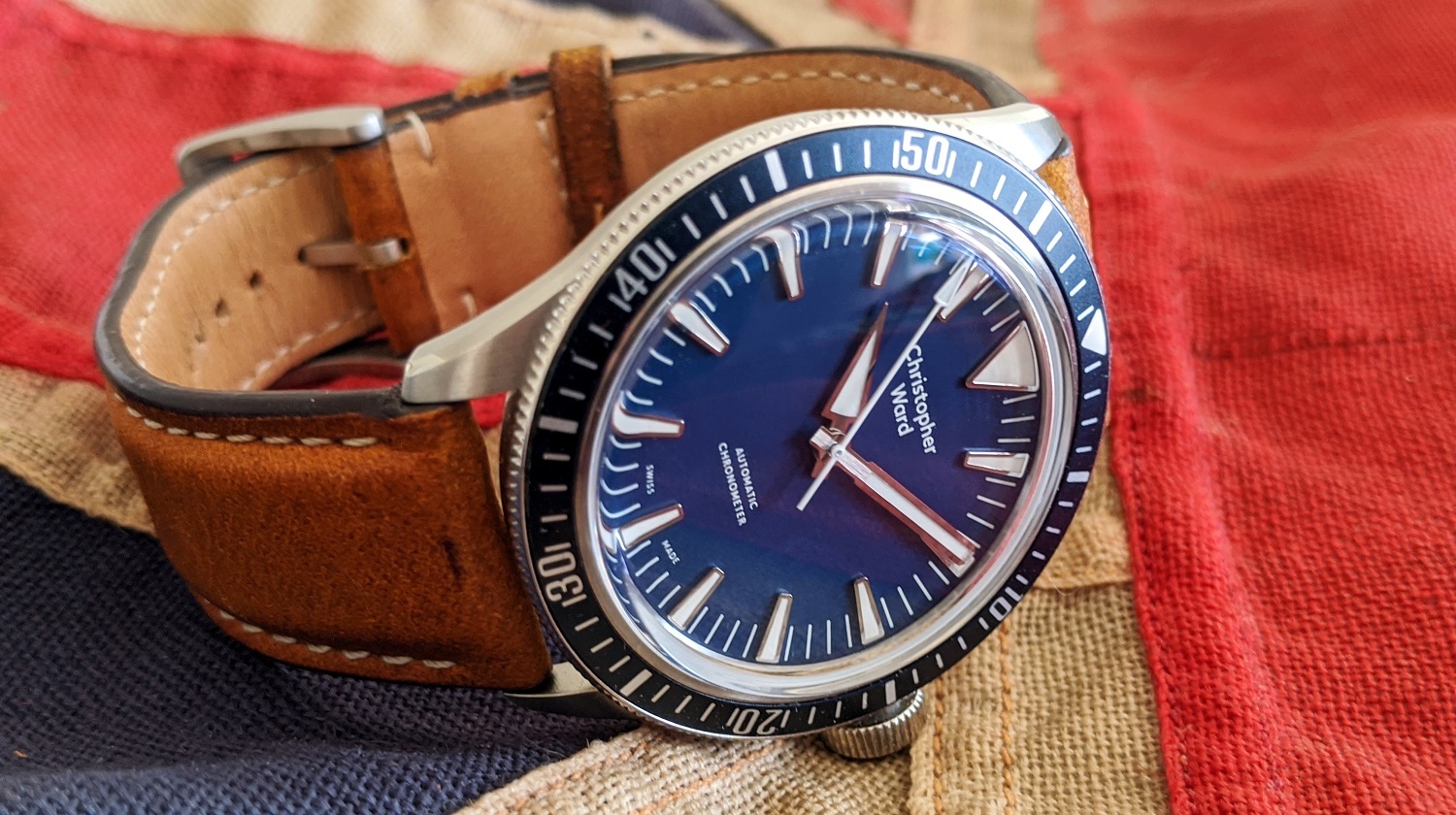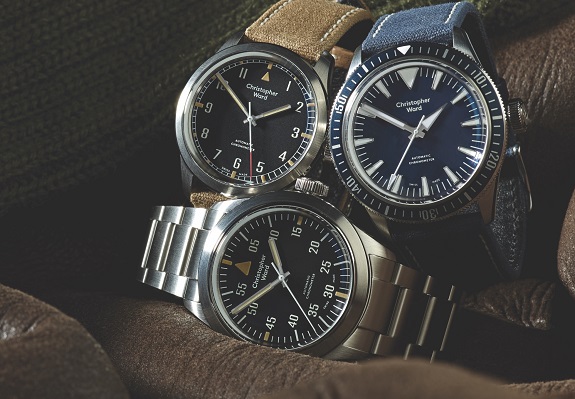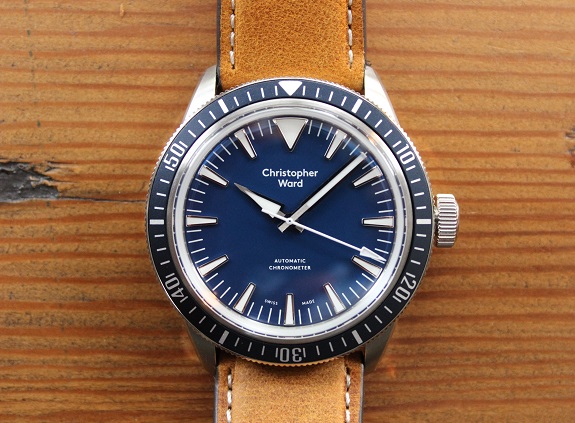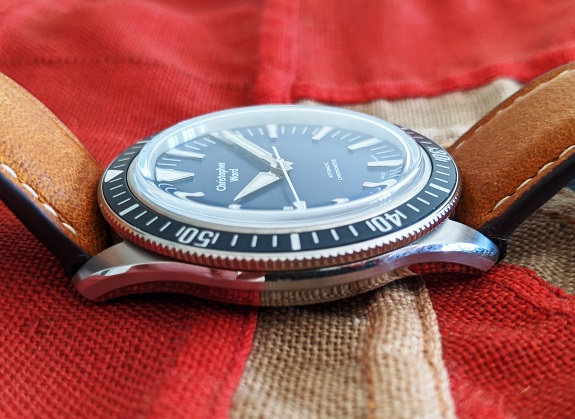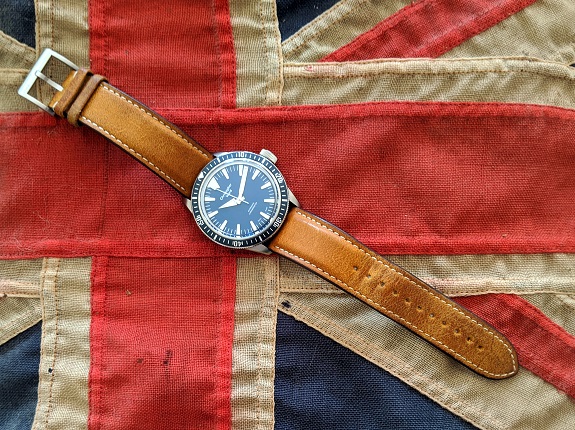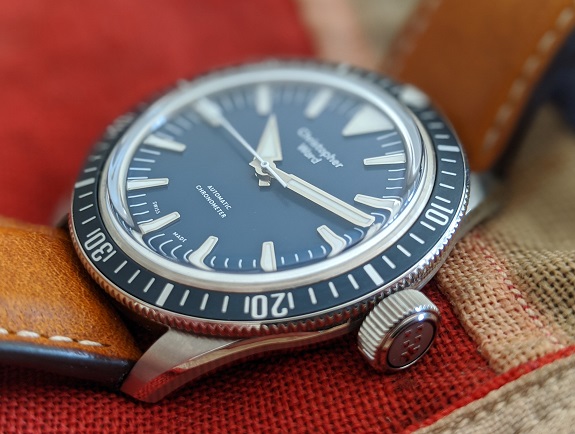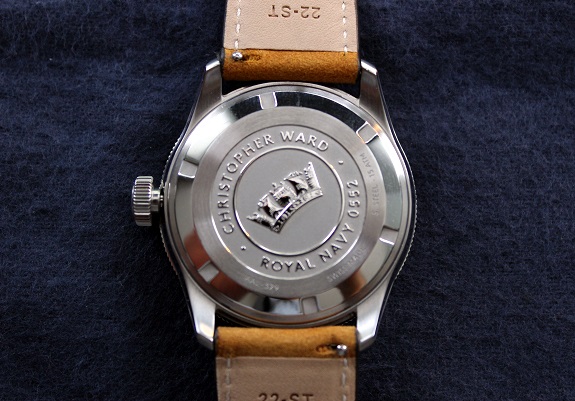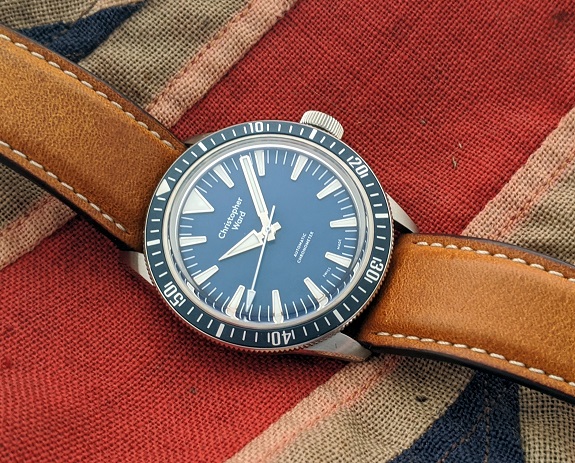Christopher Ward C65 Dartmouth Automatic Chronometer – $895
Note: Spendy, right? But if you play your cards right and you’re on the Christopher Ward email/mailing list, you can often get these for $125 off with a promo code. Also, they can be had for even less during the once or twice a year open-box “nearly new” clearance events they throw.
About the Author: Kris P. is a Philadelphia architect, development manager, and professor who is an enthusiast of old stuff, his wife and two daughters, and driving sports cars.
They say that people in committed relationships subconsciously steer clear of potential temptation. You just don’t find happily married people at closing time in certain kinds of bars. So what was I, the happy owner of more dive watches than a sane person should, doing clicking around on Christopher Ward’s website a few months back? And definitely, what was I doing when I clicked buy on the stunning C65 Dartmouth Series I in blue? What can I say, it was love at first sight.
First, some background. In the fall of 2019, Christopher Ward, a relatively young brand with a strong British self-identity, released a three-watch Series I Military Collection. Each MOD (Ministry of Defense) licensed design references classical watches with ties to the Royal Navy (C65 Dartmouth), Royal Air Force (C65 Cranwell), and Royal Army (C65 Sandhurst).
The C. Ward Military Collection (pic via their catalog/magazine “Loupe“)
All three list for $895 – $995, based on whether you go for a band or the stainless steel bracelet. All three feature Swiss Sellita SW200 COSC Chronometer movements. All three make use of Christopher Ward’s exquisite “lightcatcher” case, but the Dartmouth is definitely the looker of the line. Initially offered exclusively in a navy and white colorway, it is joined by a black and old radium colorway that is equally striking.
As mentioned, the C65 Dartmouth shares a 41mm case with the C65 Trident that I have waxed rhapsodic about on this site previously (please consider that review a pre-req to reading this one). It similarly slots in the same sporty/dressy, not-really-a-tool-diver niche. Unlike the C65 Trident, which seems like an homage to an era, the Dartmouth explicitly references a watch, the Omega Seamaster 300 “Big Triangle” that was issued to Royal Navy divers in the mid-1960s. Unlike the coveted Big Triangle, the Dartmouth features finishing (and admittedly a lack of tool-watch chops) appropriate to wear to your office, not the HMS Ark Royal. And whereas the similar Trident is intentionally a bit 60s funky, the Dartmouth shows a higher level of delicate refinement and maturity that serves it well. Another writer on this site described the Dartmouth as a watch you could wear every day for the rest of your life. With it’s combination of its Swiss chronometer movement, superb case, and beautiful dial, I can’t disagree.
Big influence from Omega’s Big Triangle? Indeed.
The blue dial is a deep navy tone, and unlike some blue watches, it’s versatile enough to be worn through the year in both formal and casual settings. The bright white applied hour markers pop with their polished metal surrounds, and their trapezoidal wedge shape adds a certain geometric, starburst-like dynamism to the face. The box sapphire crystal stands tall, and as you move the watch, the depth gives the impression of a white chapter ring when viewed at an angle that disappears when viewed head-on. It is one of the eye-catchingly best parts of the watch. For a while, Christopher Ward has placed their written logo at 9 o’clock, drawing warranted criticism. The Dartmouth’s logo, in contrast, is centered at 12 O’Clock and is the same bright white as the indices and hour markers. It all looks symmetrical, balanced, and proportioned in a way that makes it seem like the designers finally have it figured out.
The box sapphire crystal. Great depth.
A note on the “big triangle” – C. Ward’s website makes explicit reference to the Omega Seamaster 300 “Big Triangle” as inspiration. I previously wrote that I like the Dartmouth’s stable mate, the C65 Trident, because it’s somewhat of a tribute to an era, not an individual watch. I stand by my statement that it’s never nice to think that your expensive watch is just a less-nice version of someone much richer’s much more expensive watch. At first, I wished the designers had not been so explicit in referencing the Omega. That’s a bit off, though, because the Omega’s calling card is it’s interesting heritage. But the Omega is/was a tool watch. The Dartmouth’s calling card is the dial, finishing, and case, which to me, are frankly more refined and stylish than the Omega. It catches the eye in the best of ways.
Swiss made with a Sellita SW200 COSC automatic chronometer movement.
But the brand is very UK. And they certainly seem proud of it.
Behind its beautiful face, the Dartmouth impressively fits a Sellita SW200 COSC automatic chronometer movement in it’s slim (11.5mm, including the crystal) case. It hacks and hand winds as you’d expect, and as a chronometer, the Contr´le Officiel Suisse des Chronom¨tres (COSC) has certified the watch’s accuracy per ISO 3159 to -4/+6 seconds per day. Each watch ships with an individual testing report, which is neat. The case is the same as the C65, and its flying saucer-esque layering is really nicely done, combining polished and brushed surfaces with a geometry that plays to its light-catcher name. It rests comfortably on the wrist, and in spite of its 41mm diameter, it curves nicely on a smaller wrist the way the big ol’ slab cases of many divers can’t.
Continuing the vintage vibe, the crown does not have guards and it does not screw down. I wish it did. The crown is just big enough to catch on my shirt cuff. Maybe it’s just me, but more than once I have found my watch to be over an hour off, apparently from the crown pulling out on my cuff and stopping the movement. Not great. It sort of blows up the whole accurate-within-a-few-seconds-a-day chronometer certification, and could easily be solved with a screw-down crown or even the C65 Trident’s smaller crown. I might have to contact customer service and see if there’s a fix under their warranty for this.
The crown. Of which I wish screwed down.
The caseback features the Royal Navy crown insignia, in typically fine finishing for the brand, combining a number of finishing methods. This isn’t Christopher Ward’s first entry into military heritage, featuring some interesting other watches with metal re-cast from crashed Spitfires, etc. I have read comments on message boards written by British military veterans who have found intense personal connections with their watches because of these tie-ins. As an American of relatively recent and close English descent, the association is very novel and somewhat pertinent. I feel a certain connection with the nation that heightens the British-identifying brand’s appeal to me. I do wonder what the association means to non-service Britons, or those who have no ties to the country at all. Maybe it’s just a good-looking watch.
Licensed by the Ministry of Defense. Royal Navy stamped backplate.
The Dartmouth ships with a leather or canvas strap for $895, or this chronometer on their excellent stainless steel bracelet will cost you $995. I opted for the band, but I have had a chance to handle the bracelet, and I can firmly say it’s excellent now that the bracelet includes a quick release system. Yes, the bracelet includes a quick release system. Changing the previous generation bracelet, which relied on traditional spring bars, was enough to drive a saint insane. I had assumed my frustration was user error, until I watched a jeweler almost lose their mind in front of me with the same issues. The excellent, micro-adjustable clasp, solid weight, nice taper? They all remain excellent. This new quick release system? A vast improvement.
So, a few months on, do I regret my “indiscretion” on the Christopher Ward website? Certainly not. The C65 Dartmouth is the highest and most mature expression, both in terms of aesthetics and mechanics, of the already excellent C65 line. At near-$1000 (note: $125 off vouchers are easily found), it isn’t cheap, but it is a heck of a lot of watch for the money. Throw in Christopher Ward’s 5-year warranty, and I certainly consider it money well spent.
